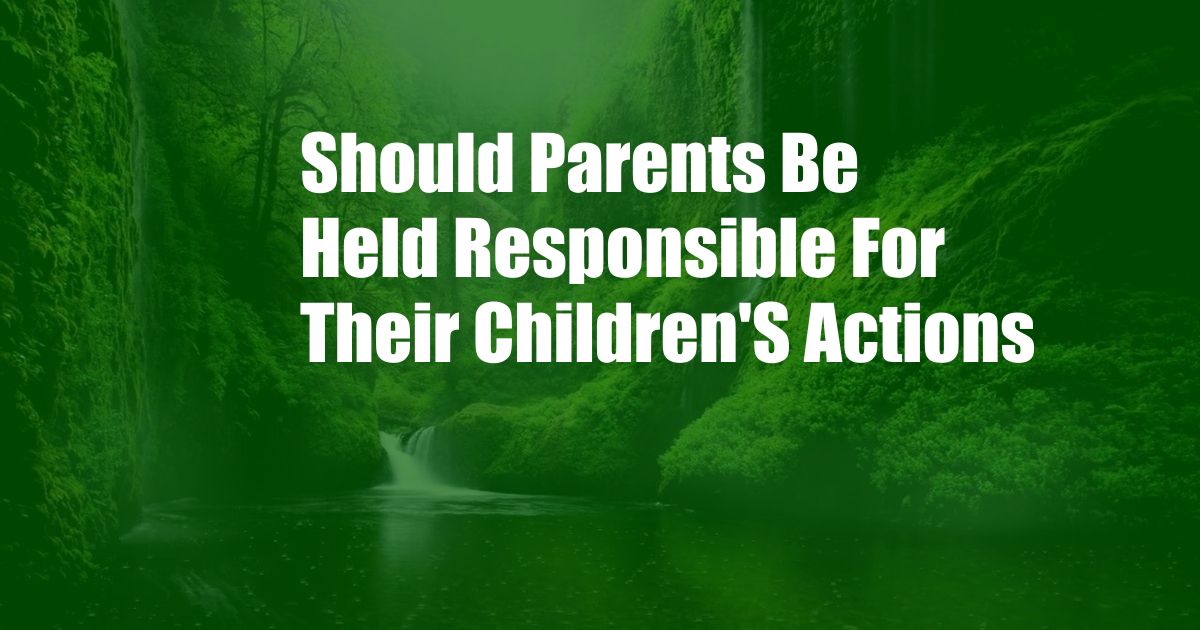
Should Parents Be Held Responsible for Their Children’s Actions?
As a parent, it’s understandable to worry about your children’s well-being and behaviour. However, should parents also bear legal or financial responsibility for the actions of their offspring?
This complex question has sparked debates and discussions for years, with varying viewpoints and arguments on both sides. In this article, we will delve into the topic, exploring its historical context, legal implications, and ethical considerations.
Vicarious Liability and Parental Responsibility
Vicarious liability refers to a legal principle that holds one party responsible for the actions of another. In the context of parental responsibility, this principle has been applied in various jurisdictions, with varying interpretations and degrees of accountability.
Historically, parents have been held liable for their children’s actions in certain circumstances, such as negligence or intentional misconduct. This liability typically arises from the assumption that parents have a duty to supervise and control their children’s behaviour.
Modern Perspectives and Legal Trends
In recent decades, there has been an ongoing debate about the appropriateness of vicarious liability for parents. Some argue that parents should be held strictly accountable for their children’s actions, as they have a significant influence on their upbringing and behaviour.
Others contend that holding parents financially or legally responsible can be unfair, especially in cases where the children have acted independently or without parental knowledge or consent. They argue that it places an undue burden on parents and can discourage them from having children or engaging fully in their children’s lives.
Navigating the Legal Landscape
The legal responsibilities of parents for their children’s actions vary across jurisdictions and are subject to ongoing interpretation by courts and legislators. In the United States, for example, the law on parental responsibility is primarily governed by state statutes and common law principles.
In general, parents can be held liable for the actions of their minor children under the following circumstances:
- Negligent supervision (e.g., failing to prevent a child from engaging in dangerous or reckless behavior)
- Intentional misconduct (e.g., aiding or abetting a child’s criminal activity)
- Statutory liability (e.g., certain laws that impose liability on parents for damages caused by their children’s actions)
The extent of parental liability and the specific legal provisions vary depending on the jurisdiction and the circumstances of the case.
Ethical Considerations and Expert Advice
Beyond the legal implications, there are also ethical considerations to consider when addressing the issue of parental responsibility. Some experts argue that holding parents accountable can promote responsible parenting and deter children from engaging in harmful behaviour.
However, others caution that imposing excessive liability on parents can be counterproductive, as it may create a culture of fear and discourage parents from seeking help or support for their children.
Experts recommend that parents take a balanced approach to parental responsibility:
- Establish clear expectations and boundaries for their children’s behaviour.
- Provide consistent supervision and guidance.
- Encourage open communication and trust within the family.
- Seek professional help if needed to address behavioural issues or concerns.
FAQ on Parental Responsibility
Q: When are parents legally responsible for their children’s actions?
A: Parents can be held liable under certain circumstances, such as negligent supervision, intentional misconduct, or statutory liability.
Q: What are the ethical considerations related to parental responsibility?
A: Ethical considerations include promoting responsible parenting, deterring harmful behaviour, and balancing parental accountability with child welfare.
Q: What can parents do to mitigate their liability for their children’s actions?
A: Parents can establish clear rules, provide appropriate supervision, encourage open communication, and seek professional help if needed.
Conclusion
The question of whether parents should be held responsible for their children’s actions is a complex one with no easy answers. It involves legal, ethical, and practical considerations that vary depending on the specific circumstances and the jurisdiction in question.
As you read this article, we invite you to reflect on your own perspectives on this topic. Have you experienced situations where parental responsibility was an issue? What are your thoughts on the ethical implications and legal trends surrounding this matter? Share your views and engage in the discussion below!